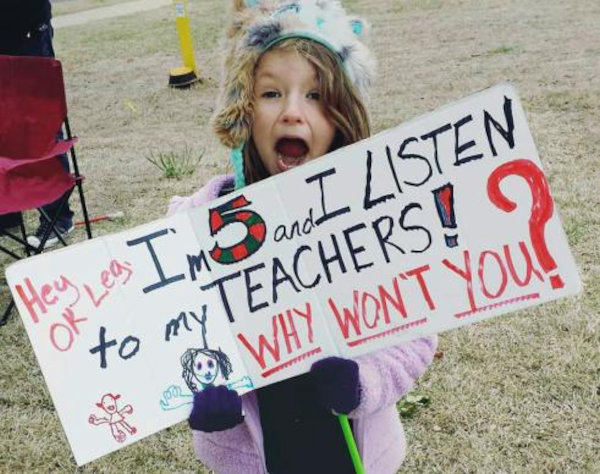Massive teacher protests have taken place in at least four states. How will people of faith respond?
The world is complicated. Faith-Link is a ready-to-use weekly lesson that helps small groups work through life’s complications together. Weekly lessons dealing with the issues and events making headlines are available by download or email.
Here is a sample of the recent lesson, “When teachers walk out,” still available at Cokesbury Digital Products.
REBEKAH JORDAN-GIENAPP
Ministry Matters
Prior to this year, teachers in the state of West Virginia were among the lowest paid in the country and had not seen a pay increase since 2014. In late February, teachers throughout the state participated in a nine-day walkout to protest their low wages. Ultimately, the teachers won a five-percent pay increase for both themselves and other state employees.
During the walkout, teachers in Oklahoma were watching their colleagues in West Virginia closely. Oklahoma’s teachers had gone a decade without a raise, and while there had been some talk about a strike prior to the actions in West Virginia, many thought it was unlikely. “But then somebody else did it,” said third-grade teacher Randi Cowan of Tulsa. “It just ignited our fire.”
What teachers are saying
In response, the Oklahoma legislature passed legislation granting pay raises of 15–18 percent. Despite the raises, many teachers still participated in planned walkouts and held massive rallies at the state capitol. The largest school districts in the state closed to honor the walkouts. Protesting teachers say the raises are inadequate because school funding in their state has still not recovered from cuts made due to the 2008 recession. The Oklahoma Education Association has also stated that the authorized pay raise doesn’t have sufficient funding to guarantee that it will continue in the long term.
Virginia Ayers, a sixth-grade teacher in Tulsa who teaches mostly low-income students, has 36 children in her class. Ayers recently had to take out a high-interest loan to afford repairs on her car. When she couldn’t afford both groceries and the loan payments, she began donating plasma to pay bills.
When Ayers was forced to turn to a local church for help paying a utility bill, she recognized some of her students in the church’s aftercare program. “It made me ashamed because I’m trying to inspire children to go to college,” Ayers said. “Here I went to college for nine years, and I can’t even support myself. What kind of role model was that?”
The same week that Oklahoma teachers began their walkout, Kentucky teachers walked out after state legislators passed a bill to significantly change their pensions. Teachers were taken by surprise because the pension changes were inserted into an unrelated bill, giving them no chance to take part in public debate. In Arizona, teachers, parents and students participated in a “walk-in” on April 11. As of this writing, Arizona teachers are still considering a possible walkout of their own.
Why are walkouts happening now?
Teacher strikes are relatively rare, especially those that go beyond an individual school district and affect an entire state. Analysts point out that cuts to education funding prompted by the 2008 recession have still not been fully restored in many states. The Center on Budget and Policy Priorities found that in 2015 (the last year in which they could get comprehensive data), 29 states were still spending less per pupil than they were in 2008.

In some states, including Arizona and Oklahoma, legislatures have passed major tax cuts during this period. Falling prices for oil and other natural resources have also affected state funding in resource-rich states like Oklahoma and West Virginia.
Teachers who have walked out say that years without raises aren’t the only problem. Oklahoma teachers and parents have been posting pictures of their outdated, crumbling textbooks on Twitter. Noah Karvelis, a music teacher in Tolleson, Arizona, says there are days he has more students than chairs in his classroom. In a class where he’s supposed to teach 40 children to play piano, he has only seven keyboards. About 20 percent of school districts in Oklahoma have had to move to a four-day school week because they can’t afford to keep their buildings open the entire week.
In some communities, teacher shortages are reaching crisis levels. Bartlesville, Oklahoma, superintendent Chuck McCauley says, “We’re literally hiring people right now that we would not even have interviewed 10 years ago” because they lack proper qualifications.
Social media seems to be playing a key role in teacher walkouts. Membership in teachers’ unions is relatively low in Oklahoma and Arizona, leaving the unions in a weaker bargaining position. However, in both states, grassroots groups of teachers have led the protests, mobilized largely through Facebook.
Budgets as “moral documents”
Historically, during high-profile budget debates, faith leaders such as Jim Wallis have declared, “A budget is a moral document.” Certainly our faith has a lot to say when we discuss who should receive more and who should receive less within our faith community — but how does that translate onto a state or national scale?
Four days into the Oklahoma walkout, a group of faith leaders came out in support of teachers at the state capitol. The Reverend Clark Frailey, pastor at Coffee Creek Church in Edmond, declared, “We are united by one central theme and that is that we have children in dire need of our help.” Research has shown that low-income children who attend better funded schools are more likely to complete high school and less likely to be in poverty when they reach adulthood.
No matter the state, issues of adequate funding for education and fair wages for teachers will continue to arise. As legislators debate and as both teachers and students call for assistance, how will people of faith respond?
Last Updated on November 10, 2023
